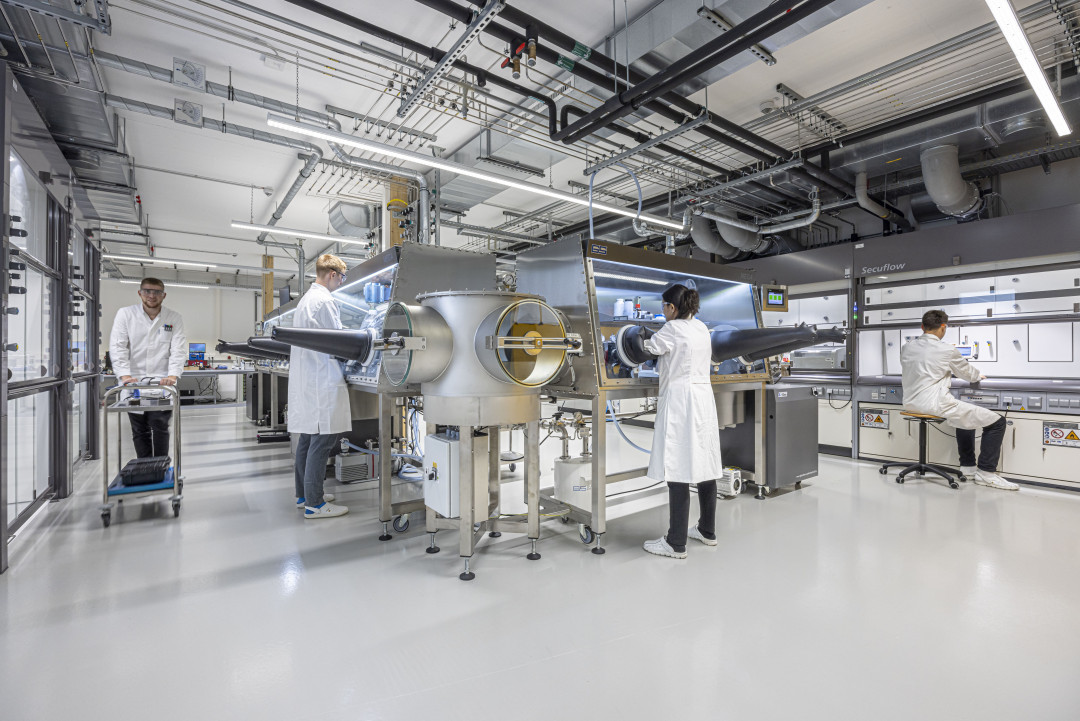
Batteries are a key component of a successful energy transition – whether for the electrification of transport, the stabilisation of the power grid or the balancing of fluctuating green electricity. The Fraunhofer Institute for Solar Energy Systems ISE has been conducting research along the entire battery value chain for years. With its new ‘Centre for Electrical Energy Storage’, which was inaugurated on 22 October, it now has state-of-the-art laboratories for international cutting-edge research. The focus of current research is on improving the sustainability, safety and performance of battery storage.
At the new centre of excellence in the Haid industrial area of Freiburg, Fraunhofer ISE will have over 3,700 square metres of laboratory space for research into innovative battery materials and cells, developing optimised solutions for battery systems, advancing their integration into various applications, and conducting comprehensive quality assurance testing on batteries. With its centre, the Fraunhofer ISE offers development and testing services from a single source for a broad range of customers, from material and battery manufacturers to mechanical engineers, integrators and operators for use in electromobility or as stationary storage systems. The institute also cooperates with industrial partners on recycling and questions regarding the possibilities for the further use of disused batteries (2nd Life).
The centre was financed by the German Federal Ministry of Education and Research (BMBF) and the Baden-Württemberg Ministry of Economic Affairs, Labour and Tourism, which each contributed nine million euros. ‘We are grateful for this funding, which has enabled us to establish a research infrastructure with state-of-the-art characterisation instruments, industry-oriented process equipment and unique facilities. This allows us to develop new materials, technologies, production processes and applications in close collaboration with our industrial customers or in close cooperation with the Fraunhofer research production facility for battery cells,’ explains Institute Director Prof. Hans-Martin Henning.
As a ‘living lab’, the building itself also serves research: in the ‘Haid-Power’ project, which was funded by the state of Baden-Württemberg with three million euros, the centre received a modular hybrid battery storage system with 836 kWh capacity, which, together with an 850-kilowatt photovoltaic system on the flat roof, supports the building's energy supply. Battery-based solutions for commercial and industrial use and new operating strategies, such as intelligent load management, can be tested under real operating conditions. For example, a fast-charging station with buffer storage is being installed as part of the BMBF-funded ‘ecoLEPuS’ project to test second-life batteries for use in high-performance applications.
As part of the energy transition, between 300 and 800 GWh of stationary battery storage will be installed in Germany by 2045, depending on the scenario. For this reason, Fraunhofer ISE addresses the sustainability of batteries in its research, starting with alternative materials to lithium and developing sustainable production processes, as well as second-life use and recycling at the end of their service life. In the current ‘PRONTO’ project, for example, the researchers are working on a sodium-ion battery technology that does not require critical raw materials and can be manufactured in Baden-Württemberg.
With the rapid development of the battery market, for both mobile and stationary applications, the need for research and testing of battery cells and systems is also continuing to increase significantly. Reducing costs and increasing performance can also open up a growing number of possible applications for electrical energy storage. Here, too, researchers are working on the entire chain from materials to operations management in order to improve energy density and performance, the number of cycles or even charging behaviour.
‘At our new centre, we can conduct characterisations at all levels, from the microstructure to the overall system, and thus identify defects and safety risks at an early stage. A current safety-related research topic is propagation, in which one battery cell after another thermally goes haywire in a chain reaction, releasing large amounts of energy,’ explains department head Dr. Daniel Biro. The test team now has a unique laboratory with sophisticated safety equipment at their disposal for this purpose, in which non-destructive tests and explosions of test specimens are also possible in special bunker rooms.

